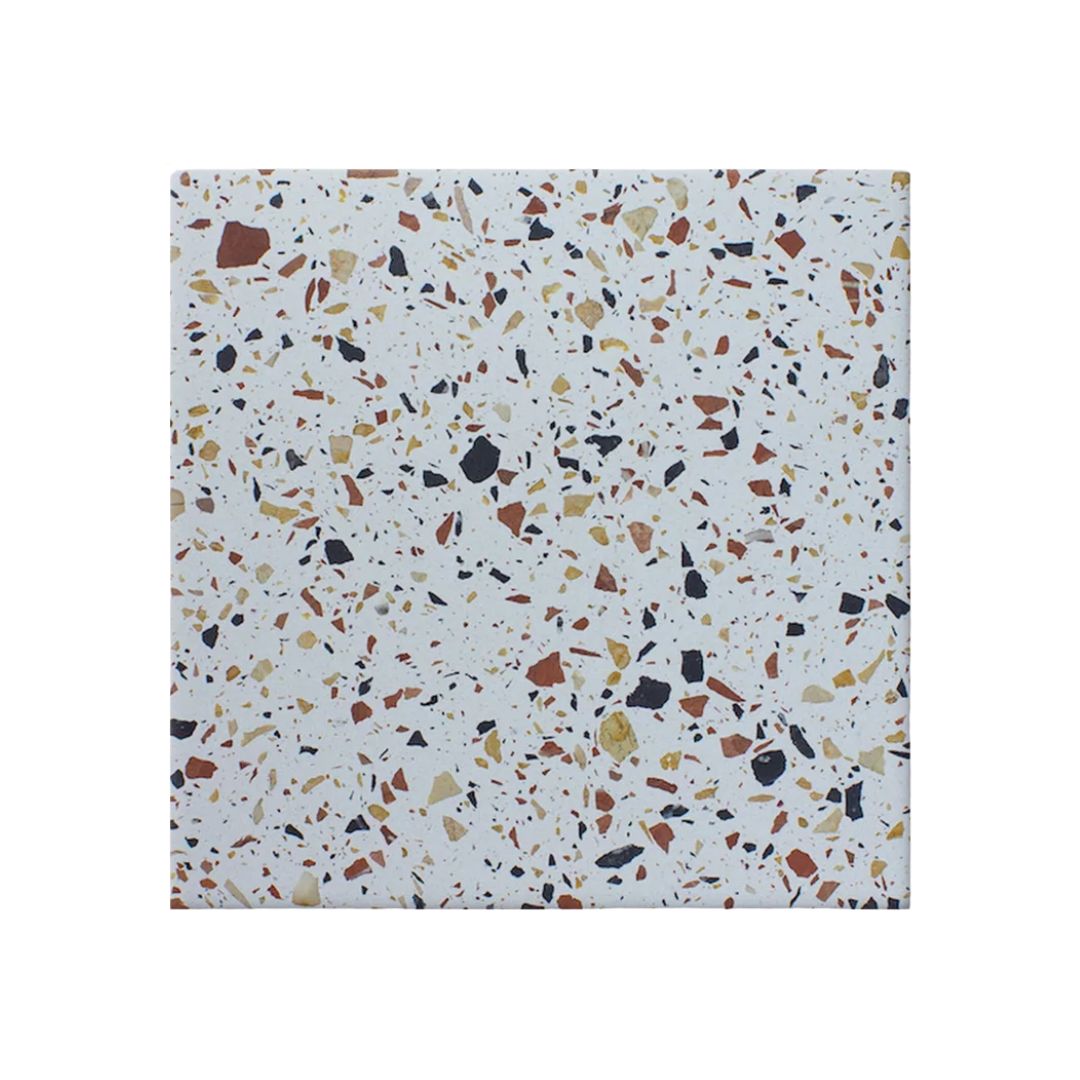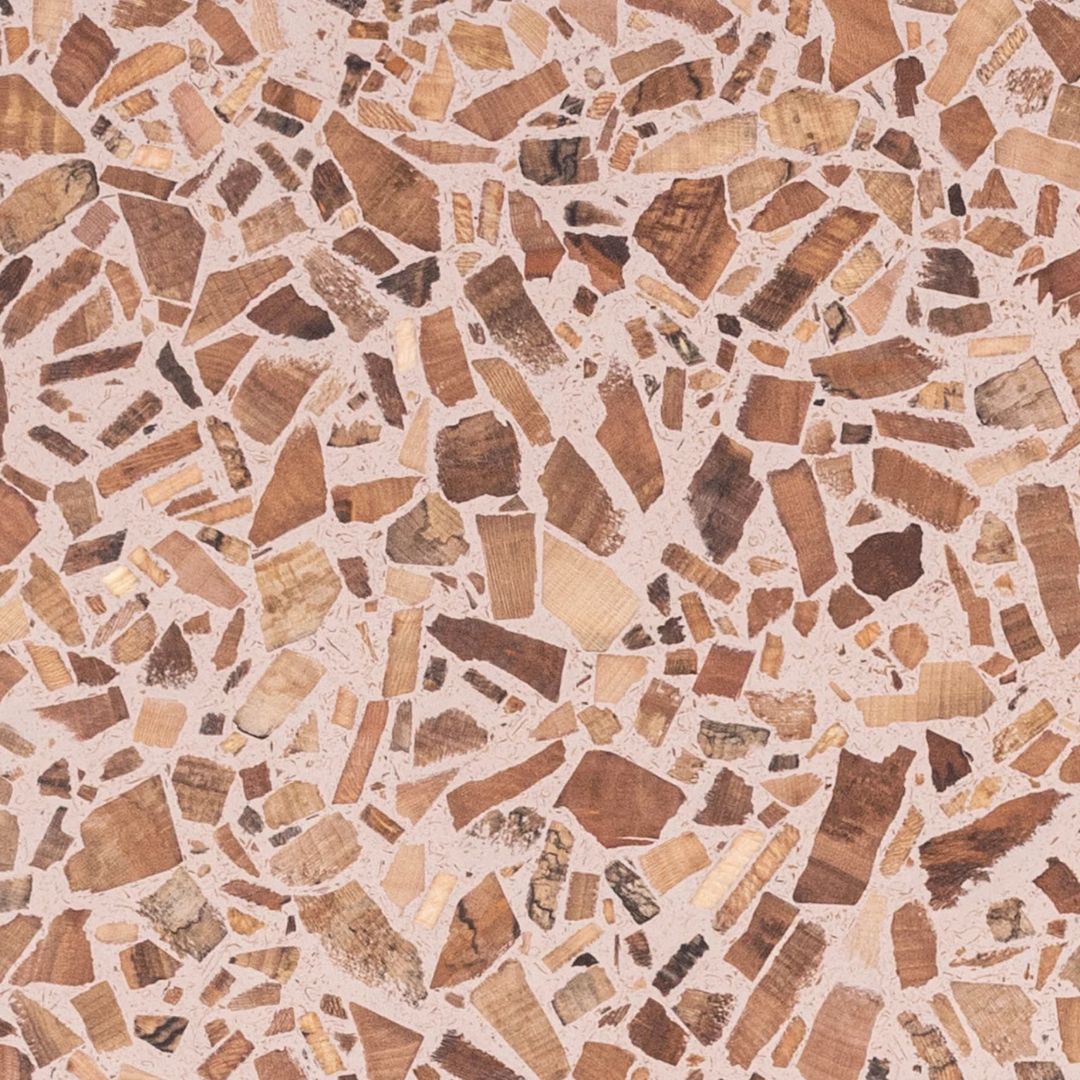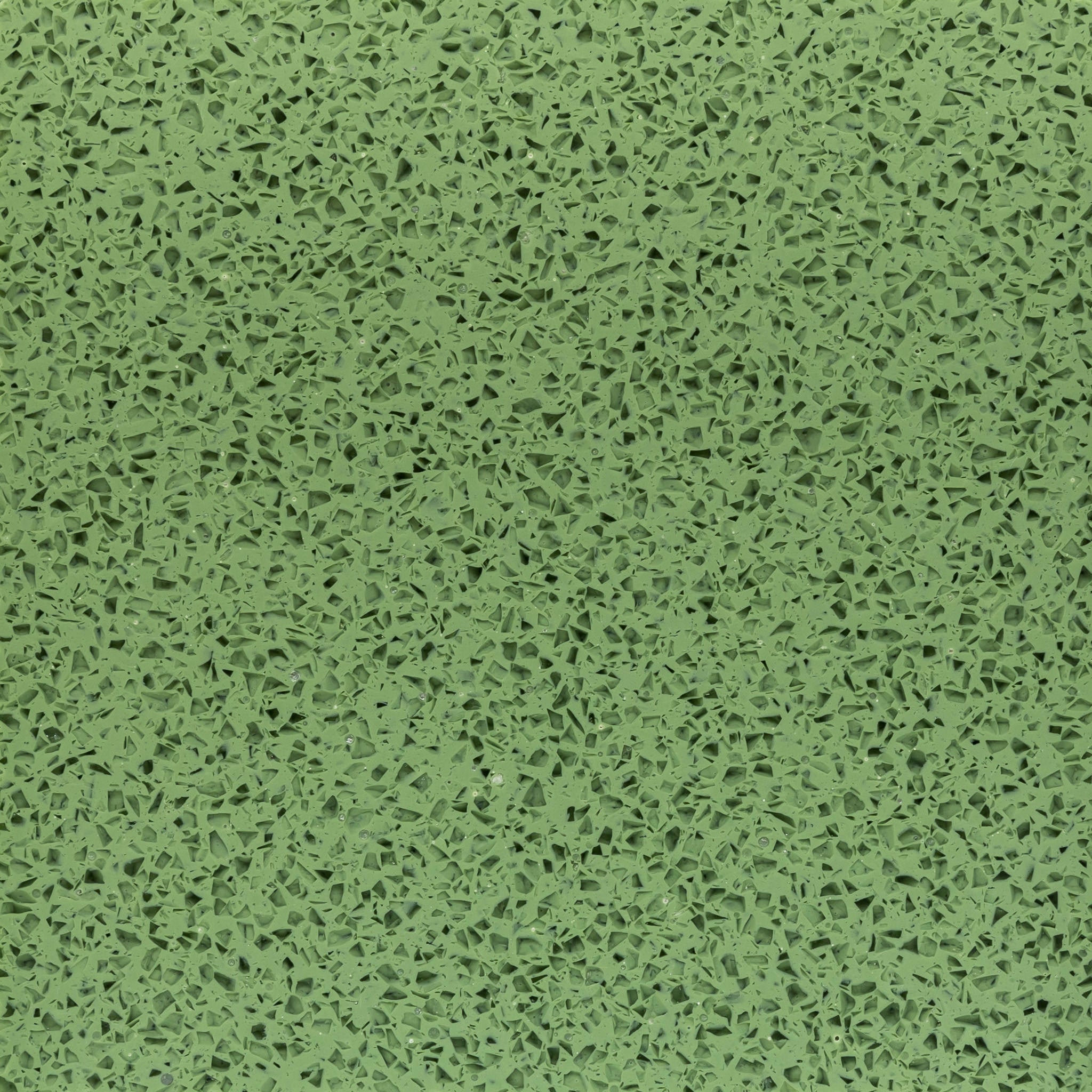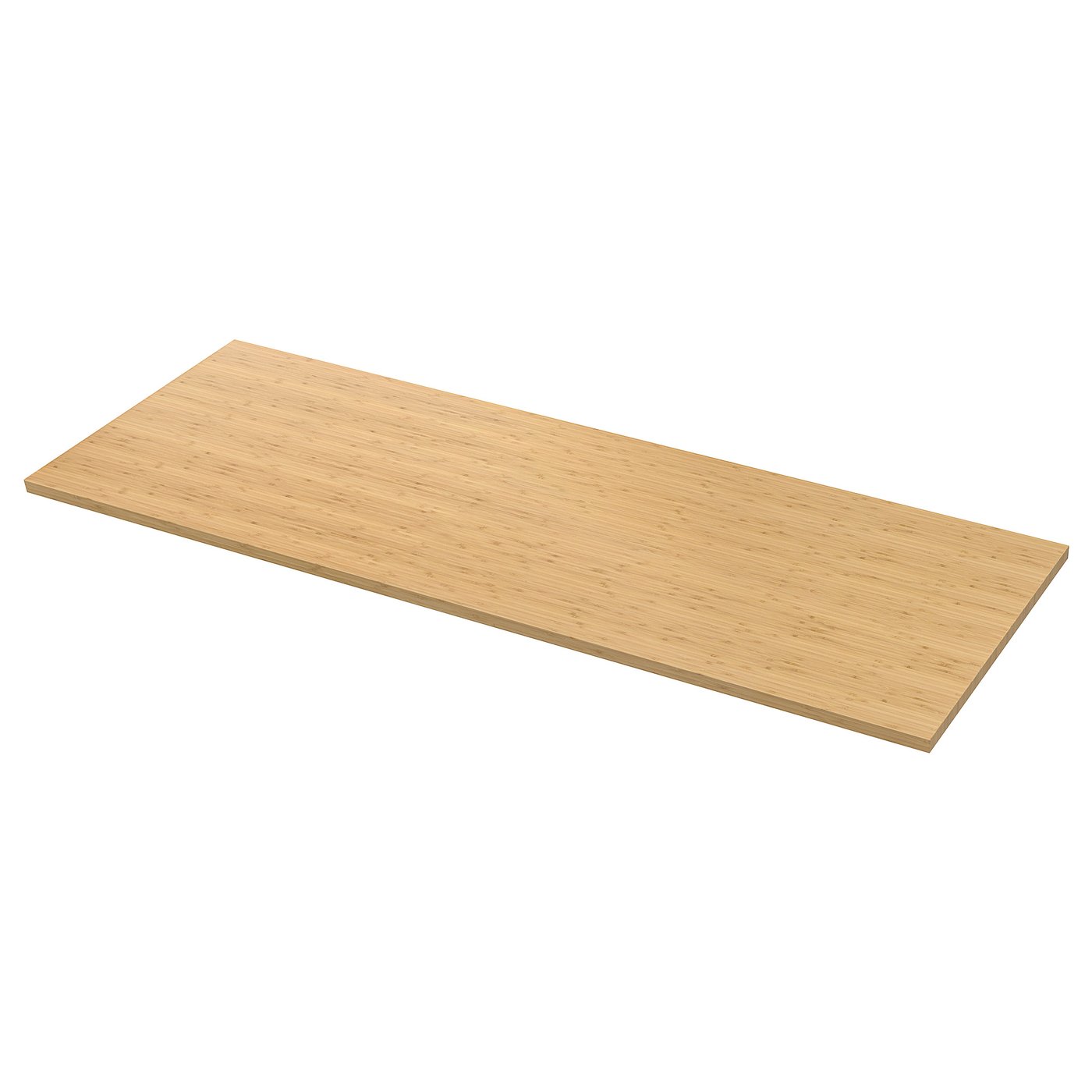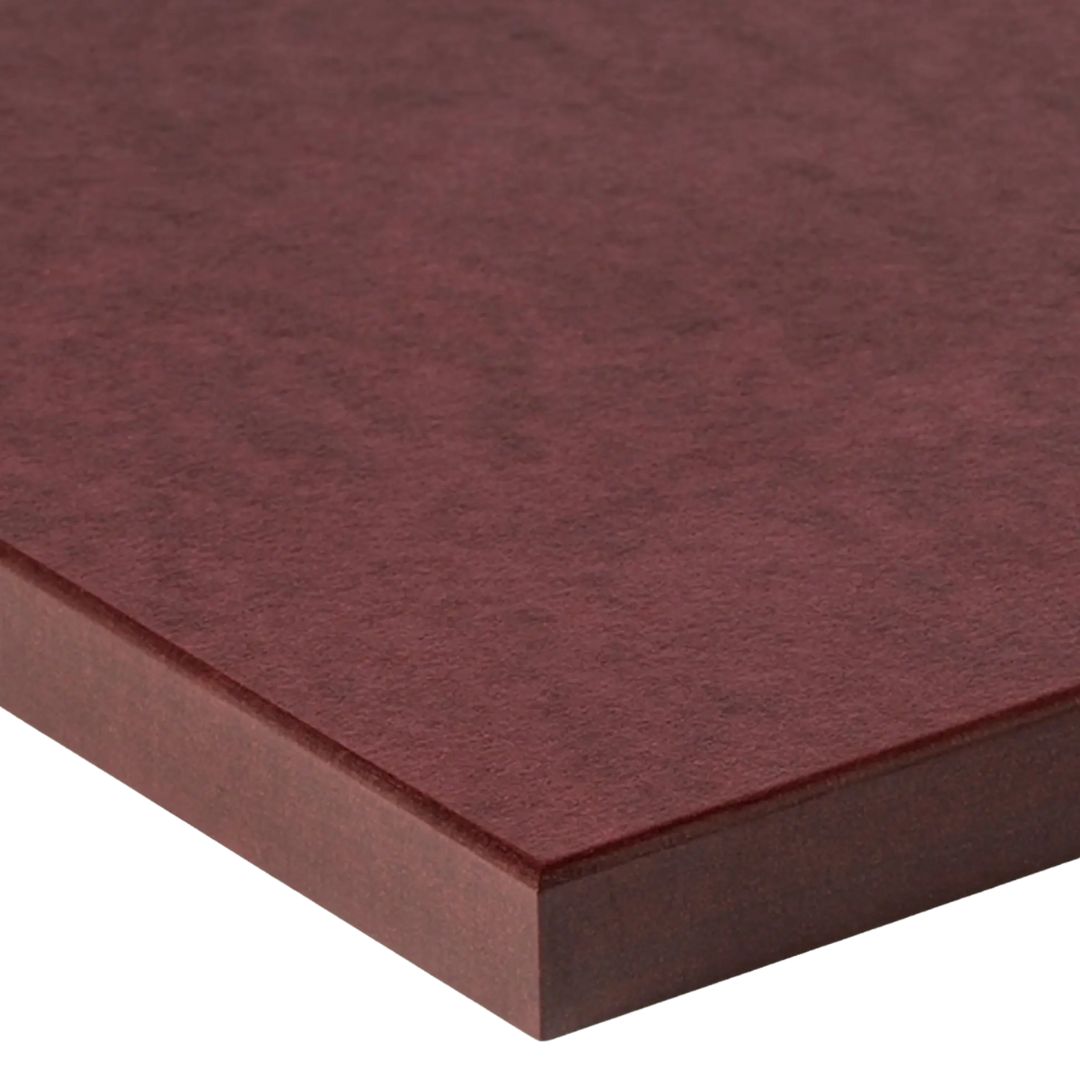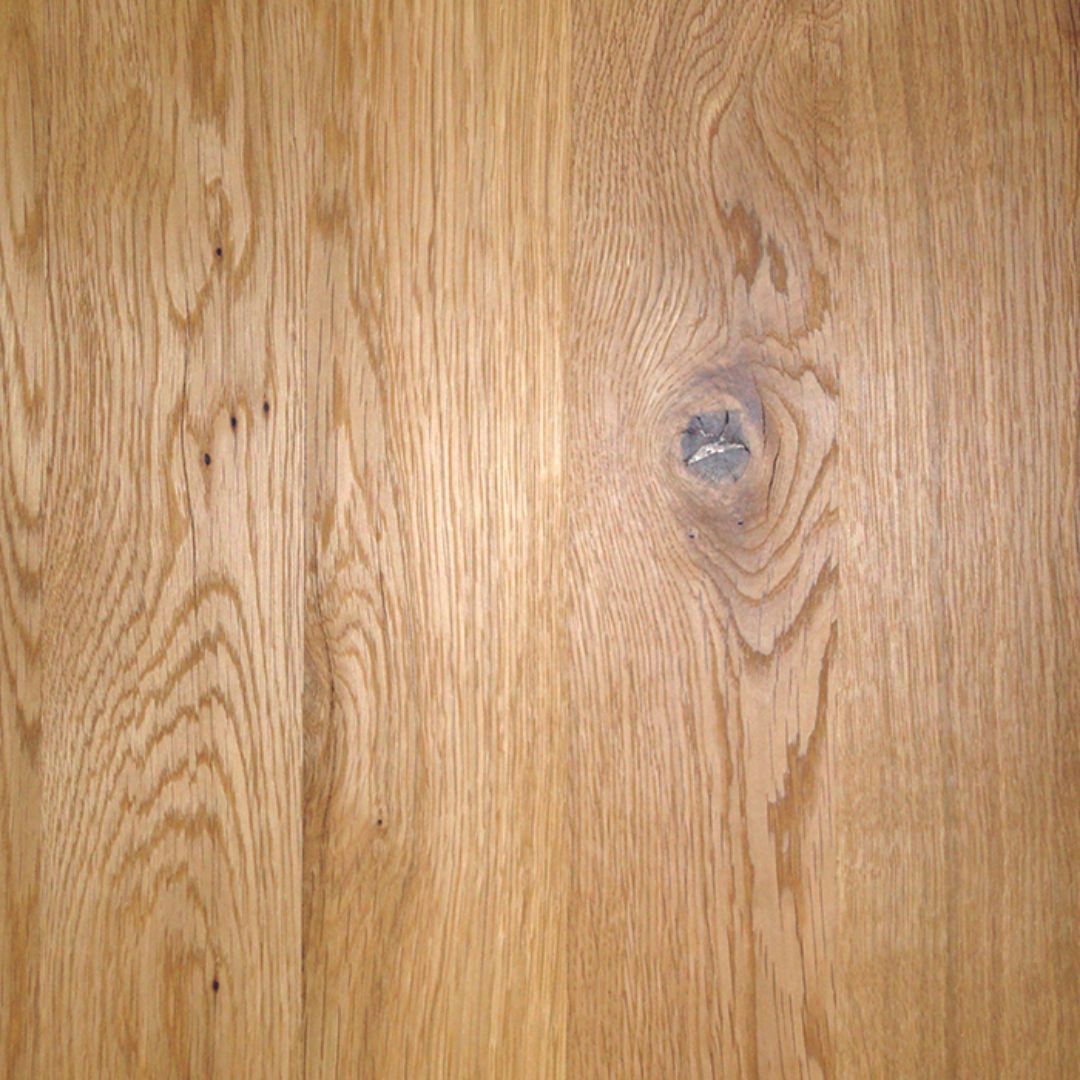What Are the Most Eco-Friendly Kitchen Countertops? 6 Materials to Explore for Your Kitchen Plans
From recycled glass to compressed paper, discover five eco-friendly countertop materials you’ll love for decades
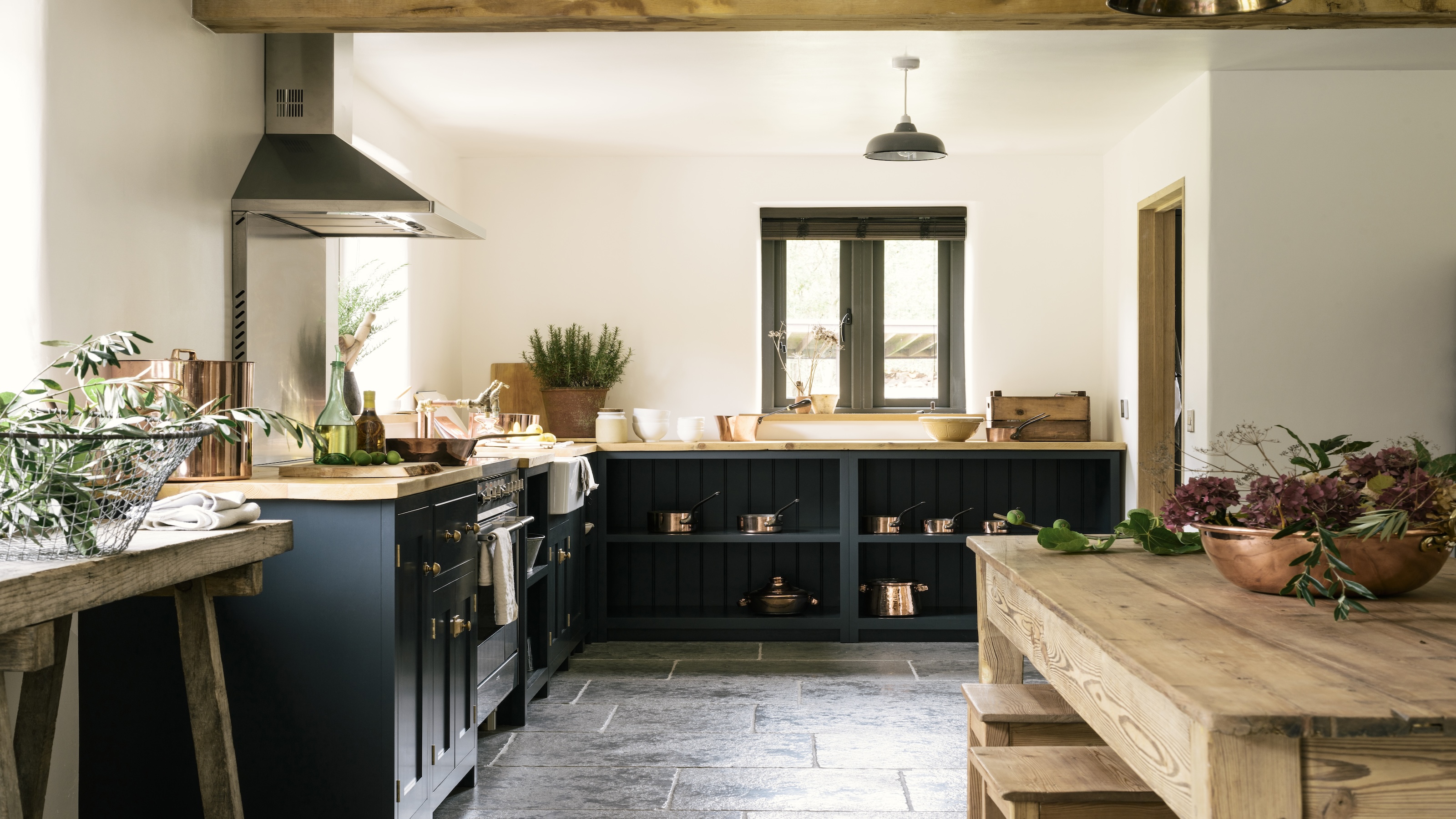
The Livingetc newsletters are your inside source for what’s shaping interiors now - and what’s next. Discover trend forecasts, smart style ideas, and curated shopping inspiration that brings design to life. Subscribe today and stay ahead of the curve.
You are now subscribed
Your newsletter sign-up was successful
Kitchen countertops are a key element of your kitchen. But how can we make kitchen worktops more sustainable in line with our other eco-friendly lifestyle choices?
Well, beyond choosing a kitchen countertop idea that lasts a long time and won’t need replacing, there are some exciting — and sometimes totally unexpected —countertop materials that are wowing the kitchen world.
Try leathery-feel paper for starters or jewel-like worktops made from recycled glass chips. Reclaimed wood countertops are another excellent choice for creating a modern rustic mood that’s both sustainable and super stylish.“Consumers are increasingly drawn to materials that actively reduce waste and encourage circularity,” explains Conor Taylor, director of Foresso waste wood surfaces. “Worktops and cabinetry that incorporate reclaimed timber, recycled composites, or low-carbon binders can help minimise reliance on virgin resources and energy-intensive processes.”
It can be all too easy to fall into the trap that a countertop is sustainable just because it’s made from natural materials, he adds. “Stone, for example, while durable and beautiful, often carries a significant carbon footprint due to quarrying and transport," says Conor. "Similarly, wood is only as sustainable as its sourcing – reclaimed or FSC-certified timber is essential, and it’s worth asking how offcuts and waste are handled.”
Don’t forget to ask about adhesives, sealants, and finishes, too. You’ll want non-toxic, low-VOC products for a healthier environment. Water usage is another significant factor. If this sounds confusing, help is at hand. We’ve consulted the experts for their advice on eco-friendly worktops that are both beautiful and durable, and truly sustainable. Read on and discover six sustainable kitchen countertops that combine style and substance.
1. Recycled Glass
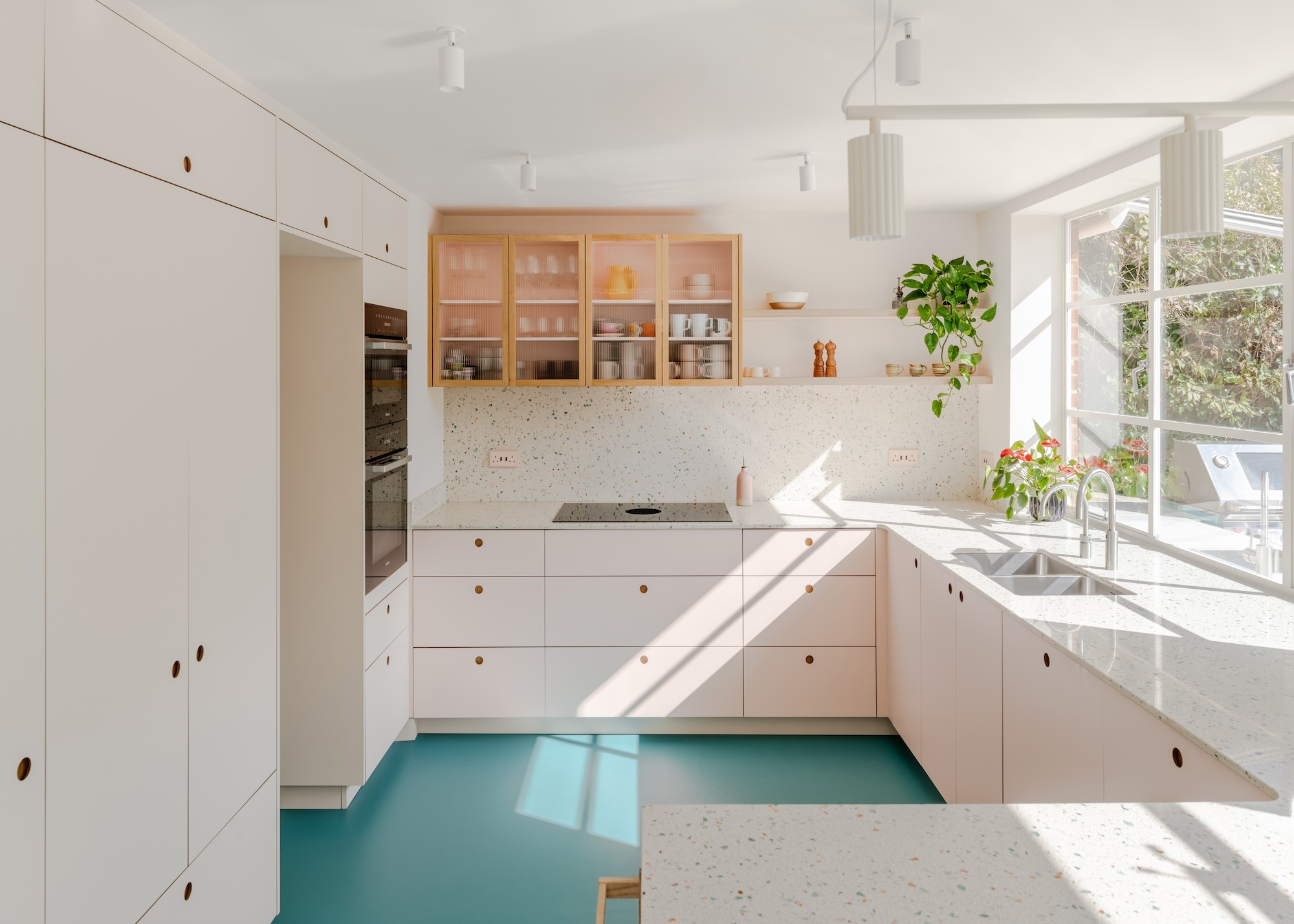
Recycled glass worktops are stylish and sustainable.
Glass kitchen backsplashes are an excellent choice for the kitchen, but have you considered a glass countertop? Especially one that contains 85% recycled waste glass, which not only reduces landfill but also looks fabulous to boot.
Enter terrazzo recycled glass surfaces — a striking and sustainable option available in a wide range of colors, from pretty, pastel hues to bold emerald. You can even specify a bespoke countertop by adding personal items (think champagne bottles and spectacles) into the recycled glass mix to make your worktop super special.
The Livingetc newsletters are your inside source for what’s shaping interiors now - and what’s next. Discover trend forecasts, smart style ideas, and curated shopping inspiration that brings design to life. Subscribe today and stay ahead of the curve.
“Unlike most other surfaces, Resilica recycled glass terrazzo is not imported from around the world, but is hand-made in a dedicated workshop in East Sussex and contains one of the highest levels of recycled content on the market,” explains Gary Nicholson, founder of Resilica. “Each piece is carefully cast into bespoke moulds, and once finished, the smooth surfaces retain some of the history and personality of the glass used in the mix.”
Recycled glass terezzo contains no solvents or VOCs (Volatile Organic Compounds), is food-safe, and is solid throughout, with no cheap fillers or plastic cores. It is also free from harmful crystalline silica, making it safer when the counters are cut, shaped, and fabricated. But how do recycled glass worktops cope with the demands of a busy kitchen? Well, the highly polished surface is easy to clean and doesn’t need sealing or waxing. It’s also highly resistant to staining, scratching, chipping, heat, and chemicals.
“Recycled glass worktops create a striking jewel-like surface,” adds Nick Cryer, managing director of Berkeley Place renovation specialists. “They are durable, stain-resistant, and available in unique color blends that make a bold design statement.”
London interior designer Juliette Byrne is also a big fan. “The best eco-friendly worktops that we use are recycled glass. They are available in large slab sizes, which avoids too many joins, and you can give the appearance of a chunkier edge detail by doubling up on the front of the surface.”
2. Timber Terrazzo
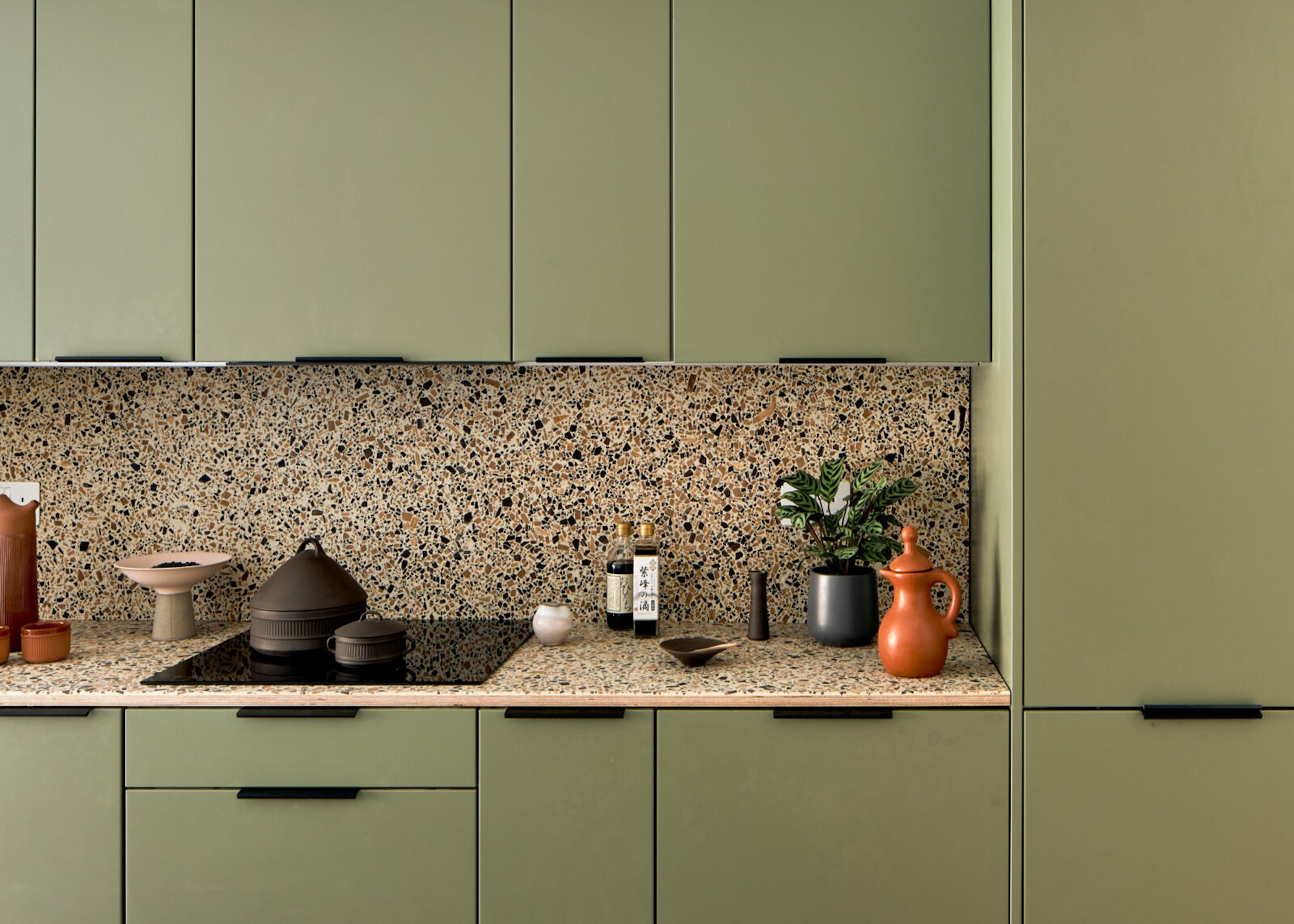
Terrazzo style, but made from timber offcuts.
We’ll never tire of wood countertops for adding warmth and character to a kitchen. But for something extra exceptional and sustainable, put timber kitchens with terrazzo worktops on your radar.
Based in Birmingham, Foresso worktops takes waste wood and transforms it into striking timber terrazzo worktops, a material usually made with glass, marble, or granite chips. Using reclaimed wood and low-carbon binders (with a minimum of 65% recycled content). The timber terrazzo sheets come in different colors and can be tailored to the size, layout, and format of your kitchen for a unique look.
“We are committed to low-carbon manufacturing, sourcing all materials within the UK, with an average travel distance of just 43 miles,” adds Conor Taylor, founder of Foresso.
Hand finished with natural hardwax oil for extra protection, timber terrazzo is tough and can last up to 50 years with proper maintenance.
Now, while Foresso countertops are a premium buy, the brand is also actively developing new materials to make ethically and sustainably made products more accessible in both supply and price.

Conor is the co-founder and director of Foresso, a Birmingham-based manufacturer of low carbon timber terrazzo surfaces from waste wood. With a background in fine art, Conor brings a different perspective to design
3. Recycled Plastic
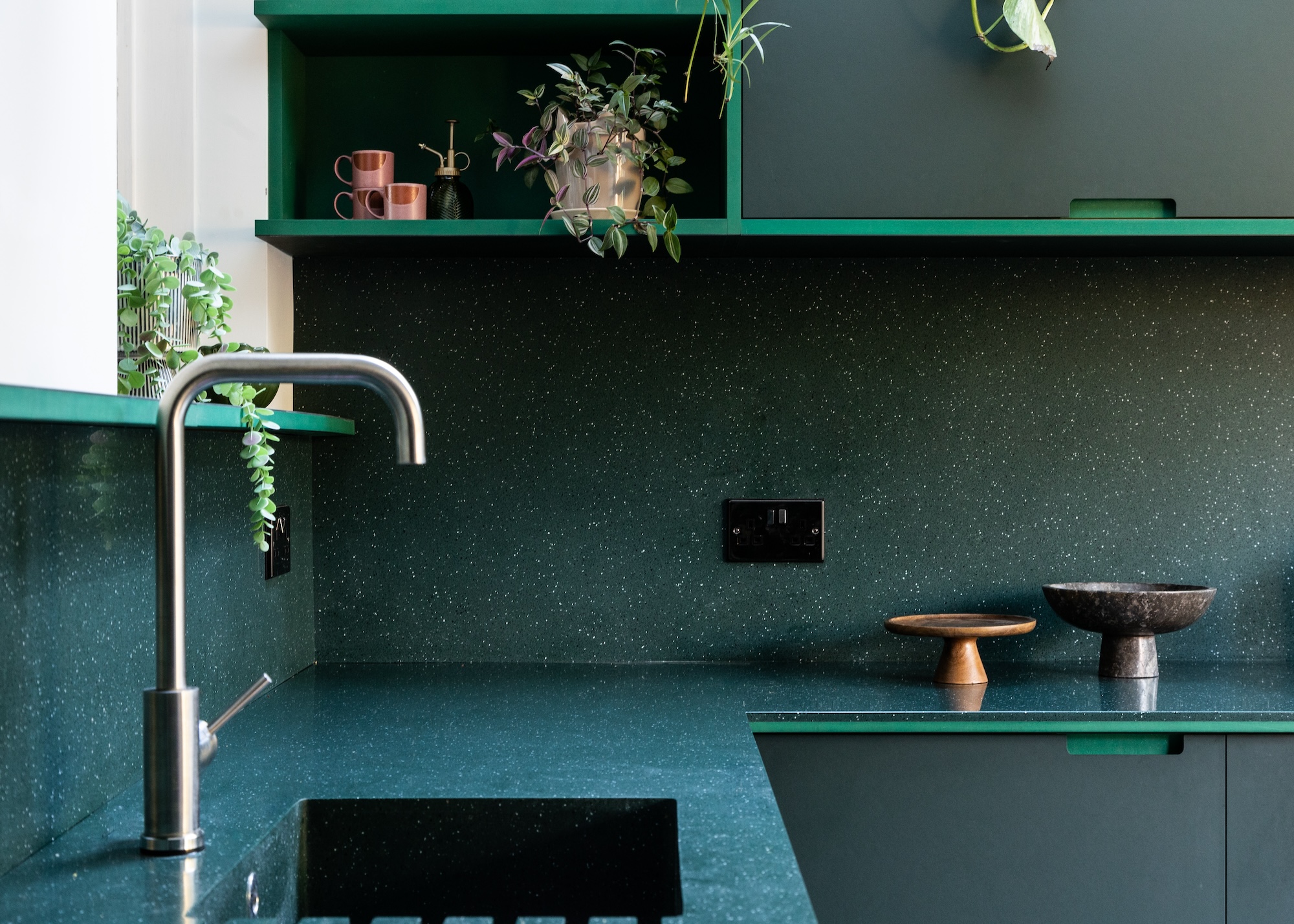
Your green kitchen just got greener thanks to a recycled plastic worktop.
You might be familiar with solid kitchen countertop materials, but for a sustainable alternative, how about a recycled solid surface countertop?
One option is Durat a colorful, design-led surface made from 30% recycled plastic collected from manufacturing and waste management companies in Sweden and Finland.
The recycled plastic is then granulated into small chips and cast into a resin base to create durable, silky sheets of solid surface. Durat is also a circular material, so kitchen countertops can be repurposed into something new or returned to be recycled into new sheets of solid surface.
4. Bamboo
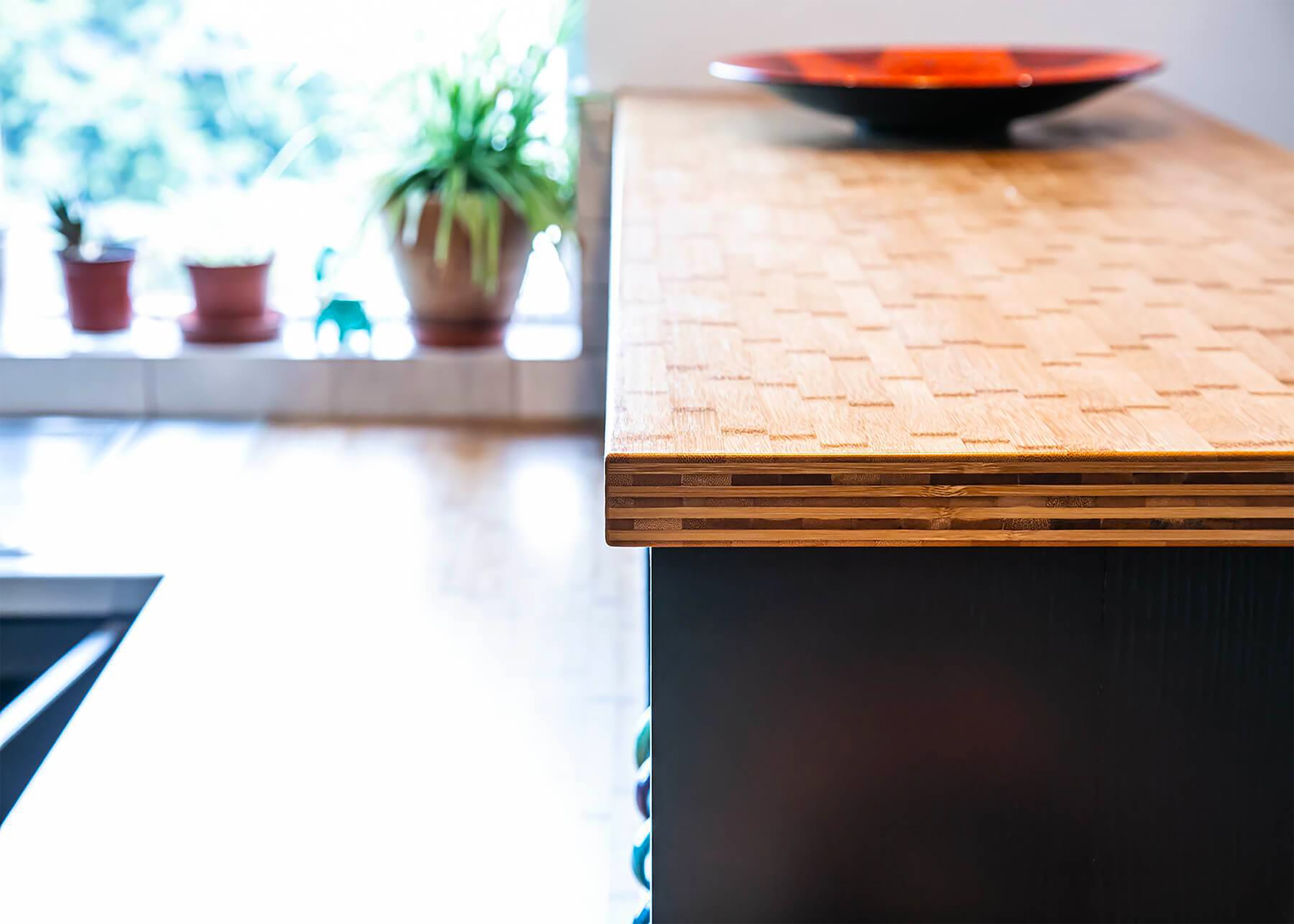
Bamboo worktops are the perfect touch of class and timelessness.
Bamboo countertops are an excellent choice if you’re looking to up your eco credentials. Bamboo is one of the fastest-growing renewable resources in the world. It also absorbs large amounts of carbon as it grows and regenerates quickly without the need for replanting.
Bamboo countertops are strong and stable and will give you a warm, natural look that’s so popular in today’s kitchens. As well as being sustainable, bamboo worktops don’t cost the earth in terms of price either.
“Bamboo worktops generally sit in the mid-range when compared with other options,” says Ken Downing director at UK Bamboo. “They are usually more affordable than solid hardwoods and natural stone such as granite or marble, but more of an investment than laminate."
“Fast-growing and renewable, bamboo offers a sleek, contemporary look with warm, natural tones,” adds Nick at Berkeley Place. “It is both strong and lightweight, making it an elegant yet practical choice.”
However, if you are wondering about the maintenance of wooden countertops, it's best to do your research and find out whether they are indeed hard to maintain.
5. Recycled Paper
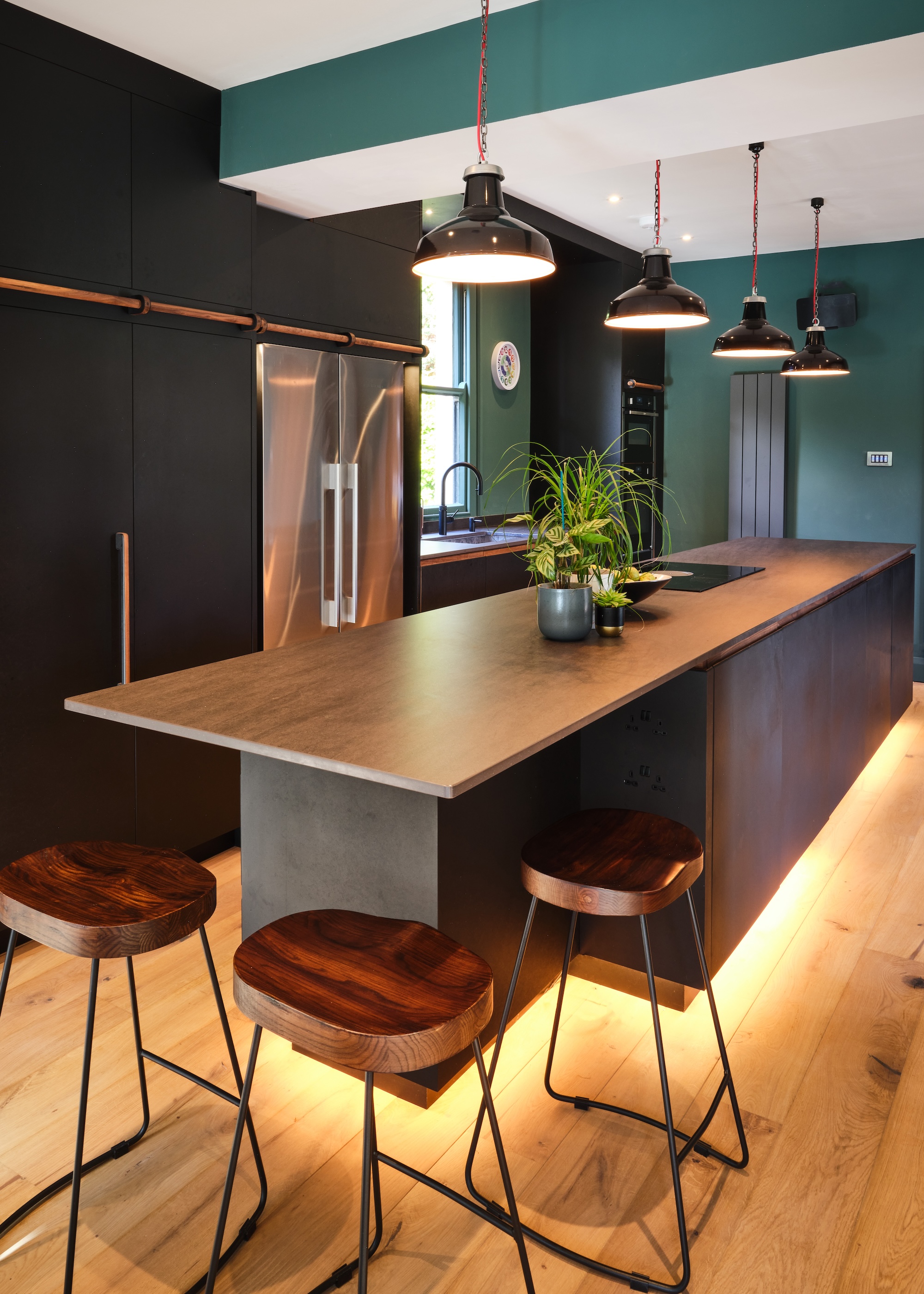
Recycled paper worktops are super sustainable and here's why...
Countertops made from paper? Yes, modern kitchen surfaces made from paper might be an unexpected choice, but it’s a really exciting material and packed with eco plus points.
With a mottled appearance and leathery feel, Richlite is a premium surface made from 65% recycled paper that will wear and develop a patina over time. It’s made from layers of high-quality decorative paper, saturated with a thermosetting resin, then bonded with heat and pressure.
All of the paper is either consumer waste that’s been recycled or sustainably harvested paper. The result is strong, non-porous, and heat and water-resistant, so perfect for kitchen countertops.
“Richlite can be reused and refinished, and we take back any Richlite at the end of its useful life with our Material Rescue programme,” adds Jane Campbell, strategy director at Surface Matter, a certified B Corp company that supplies sustainable surfaces like Richlite and Durat. “Colors are all earthy warm tones, which will go deeper and warmer with time and use. It can be leathered to a suede-like finish or polished to make its patina more prominent.”
6. Reclaimed Wood
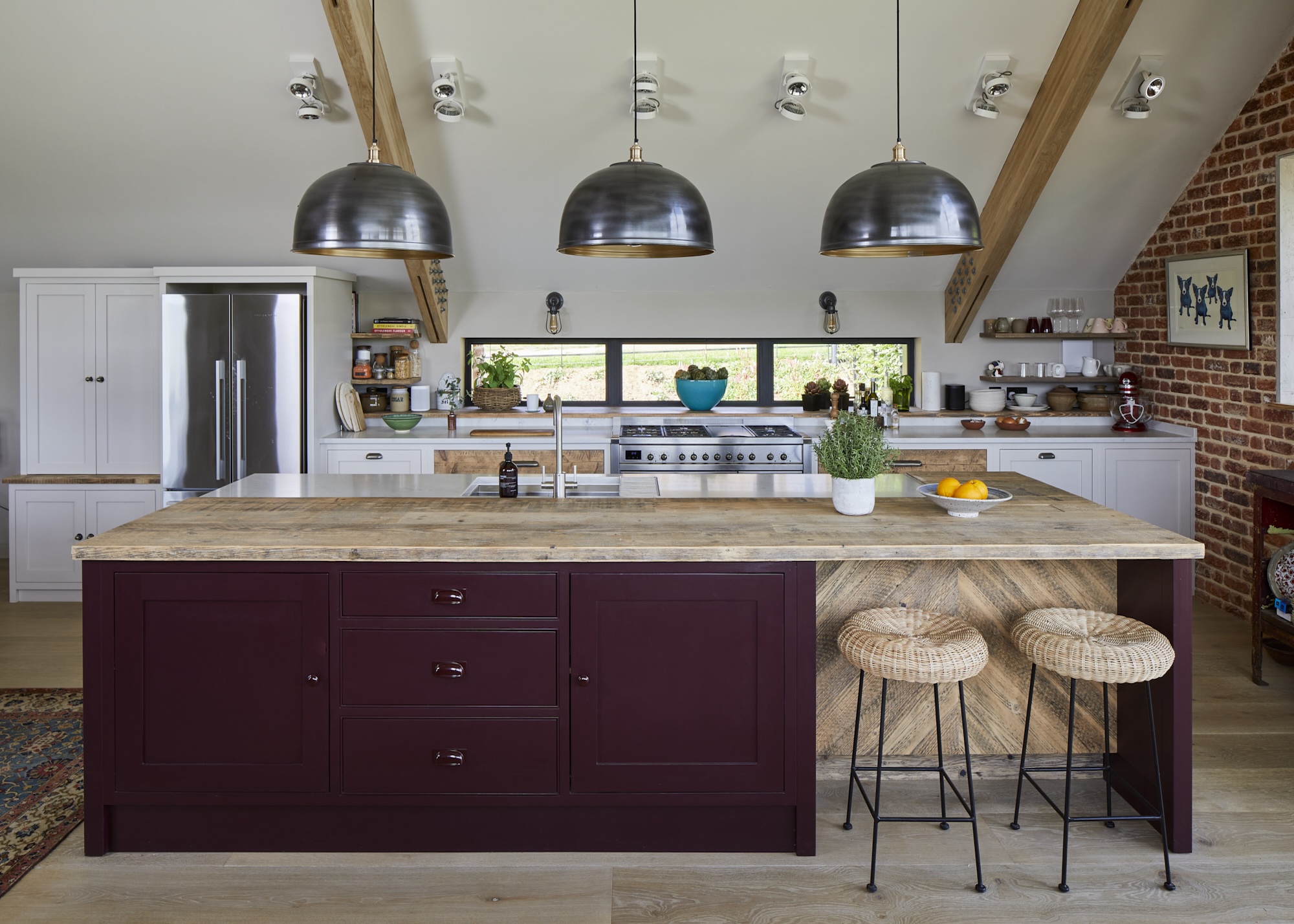
Reclaimed wood is a great option if you’re looking to install an eco-friendly countertop in your kitchen.
Reclaimed wood is a great option for installing an eco-friendly countertop in your kitchen. “Reclaimed wood is sustainable by the mere fact that it is being reused, upcycled, and gives a new lease of life and purpose,” says Alex Main, director of The Main Company. “The inherent natural character and wood grain add unique visual appeal to the space, while accentuating depth and texture.”
“Heritage reclamation companies will help you suggest your preferred wood tone and work within your budget to achieve the right type of kitchen worktops,” adds interior designer Juliette Byrne. “These can also be coordinated with your dining table and dresser so you achieve a vintage, cohesive feel.”
For longevity and durability, try reclaimed engineered wood. “We would source wood that would otherwise go to waste, such as wood found on old barns, historic structures, and abandoned textile mills, for example,” explains Alex. “Then we would turn it into reclaimed engineered wood.”
The process involves fusing multiple layers of wood, making it more stable and less susceptible to changes in humidity and temperature. You’ll get the rustic aesthetic of reclaimed wood, but with added strength in your wood-drenched kitchen.

Alex is the director of The Main Company, specialists in bespoke kitchens, reclaimed flooring and cladding, and bespoke furniture. Every project is handmade by master craftsmen in the company’s North Yorkshire workshops
FAQs
Is Quartz Less Toxic Than Granite
Manmade engineered quartz and natural granite are both popular materials for kitchen countertops. Both are generally considered safe in their completed form once installed in the home. The main risk is from the crystalline silica dust that’s generated when the worktops are cut, shaped, and fabricated.
The dust contains toxic materials that can lead to severe lung damage. That means it is the installers and workers who are involved in the fabrication and cutting of quartz and natural granite who are more at risk, not the homeowner.
Choosing an eco-friendly luxury worktop means investing in beauty, durability, and a sustainable future. “Proof that high-end design can be both stylish and responsible,” explains Nick at Berkeley Place.
Generally speaking, sustainable worktops are a premium product, and most of the countertops mentioned above will be more expensive. But it’s an investment that will stand the test of time while you help do your bit for the planet.
“Trends come and go,” adds Conor at Foresso. “But a well-designed sustainable kitchen is one that grows with you. Multifunctional materials and quality over quantity mean fewer replacements, less waste, and a space that continues to serve you beautifully for years to come.”
